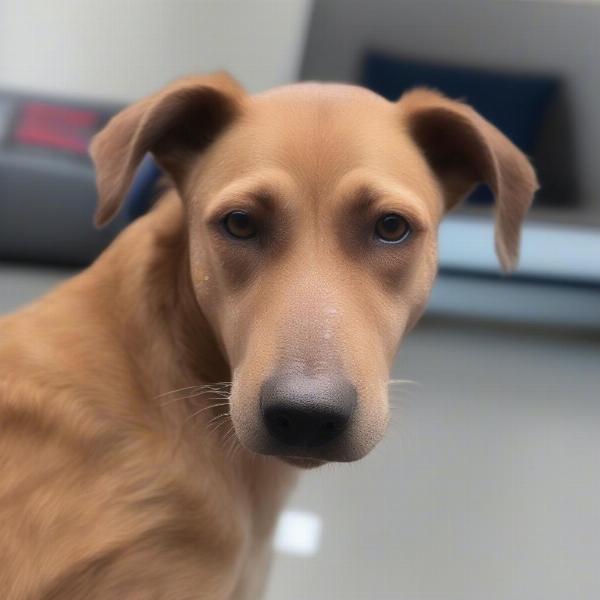Seborrhea in dogs can be a frustrating skin condition for both pet and owner. Finding the right seborrhea shampoo for dogs is crucial for managing this often chronic issue. This guide will delve into the causes of seborrhea, the different types of seborrhea shampoos available, and how to choose the best one for your furry friend. We’ll also cover proper bathing techniques and other important considerations for managing your dog’s skin health.
While genetics can predispose some breeds to seborrhea, various factors can trigger or exacerbate the condition, including allergies, hormonal imbalances, and parasites. Identifying the underlying cause is essential for effective long-term management. This often involves a trip to the veterinarian for a proper diagnosis and treatment plan. Seborrhea shampoos play a key role in managing the symptoms of this skin condition, which include scaling, flaking, redness, and a greasy or waxy coat. These specialized shampoos are formulated to cleanse the skin, remove excess oil and scales, and soothe irritation.
Understanding Canine Seborrhea
Canine seborrhea, also known as seborrheic dermatitis, is a common skin condition characterized by excessive scaling and oil production. It can range from mild dandruff to severe flaking and inflammation. There are two main types: oily seborrhea (seborrhea oleosa) and dry seborrhea (seborrhea sicca). Many dogs experience a combination of both.
Types of Seborrhea and Their Symptoms
- Oily Seborrhea: This type presents with greasy, waxy skin and a musty odor. The coat often appears oily and matted. Secondary bacterial infections can occur due to the excess oil.
- Dry Seborrhea: Characterized by dry, flaky skin, dandruff, and itching. The coat may appear dull and brittle.
 Dog Seborrhea Symptoms
Dog Seborrhea Symptoms
Choosing the Right Seborrhea Shampoo for Dogs
Selecting the appropriate seborrhea shampoo is crucial for managing your dog’s skin condition effectively. Different shampoos contain various active ingredients designed to address specific aspects of seborrhea. Consulting with your veterinarian is highly recommended to determine the best option for your dog’s individual needs.
Key Ingredients in Seborrhea Shampoos
Several ingredients are commonly found in seborrhea shampoos for dogs:
- Keratolytic Agents: These ingredients, such as salicylic acid and sulfur, help break down and remove excess keratin, which contributes to scaling. salicylic acid for dogs
- Antibacterial and Antifungal Agents: Ingredients like chlorhexidine and ketoconazole help control secondary infections that can worsen seborrhea. chlorhex for dogs ketohex dog shampoo
- Emollients and Humectants: These ingredients help moisturize and hydrate dry skin, reducing flaking and itching.
Bathing Your Dog with Seborrhea Shampoo
Proper bathing technique is essential for maximizing the effectiveness of seborrhea shampoo. Follow these steps for optimal results:
- Wet your dog’s coat thoroughly with lukewarm water.
- Apply the prescribed amount of shampoo, focusing on affected areas.
- Gently massage the shampoo into the skin and coat, working up a lather.
- Allow the shampoo to sit for the recommended time (usually 5-10 minutes).
- Rinse thoroughly, ensuring no shampoo residue remains.
- Towel dry your dog or use a hairdryer on a low setting.
Beyond Shampoo: Other Considerations for Managing Seborrhea
While seborrhea shampoo is a valuable tool, other factors can contribute to your dog’s skin health. A balanced diet, regular grooming, and parasite prevention are essential for overall well-being. dog medicated shampoo anti seborrheic dermatitis shampoo for dogs
Conclusion
Managing seborrhea in dogs requires a multifaceted approach. Choosing the right seborrhea shampoo, along with proper bathing techniques and a holistic approach to skin health, can significantly improve your dog’s comfort and quality of life. Always consult with your veterinarian for personalized advice and treatment recommendations.
FAQ
- What causes seborrhea in dogs? Seborrhea can be caused by genetics, allergies, hormonal imbalances, or parasites.
- How often should I bathe my dog with seborrhea shampoo? The frequency depends on the severity of the condition and your veterinarian’s recommendations.
- Can seborrhea be cured? While often chronic, seborrhea can be managed effectively with proper treatment and ongoing care.
- Are there any home remedies for seborrhea in dogs? Consult your veterinarian before trying any home remedies, as some may worsen the condition.
- Is seborrhea contagious? No, seborrhea is not contagious to other pets or humans.
- Can diet affect seborrhea in dogs? A balanced diet can support overall skin health and may help manage seborrhea symptoms.
- What are the signs of a secondary infection with seborrhea? Increased redness, itching, odor, and discharge may indicate a secondary infection.
ILM Dog is your trusted resource for expert dog care advice and information. We specialize in breed selection, health and medical care, training and behavior, nutrition, grooming, and product recommendations. Whether you’re a new dog owner or a seasoned expert, ILM Dog provides reliable and practical guidance for every aspect of dog ownership. Contact us today at [email protected] or +44 20-3965-8624 for personalized support. Visit us at ILM Dog for more valuable insights.